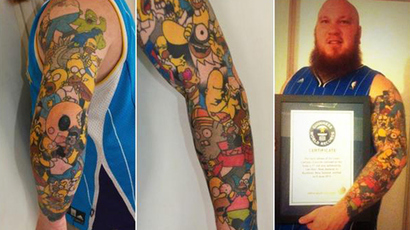Lectures from the deep: 2 professors begin record 73-day underwater stint (VIDEO)

A pair of educators from Roane State Community College in landlocked Tennessee are aiming to find a place in the Guinness Book of World Records after spending 73 consecutive days underwater while living in a small room and conducting online lectures.
“We’re excited, after months of planning, to begin our
mission to raise awareness about marine science and ocean
conservation and to encourage young students to pursue science
fields,” said 63-year-old biology professor Bruce Cantrell,
ahead of his immersion on Friday.
The scholarly Cantrell makes up half of a contrasting pairing,
along with enthusiastic 25-year-old adjunct professor Jessica
Fain. The two will spend the time 25 feet underwater in the
cramped quarters of the Jules' Undersea Lodge in Florida. The
lodge markets itself as the world’s only underwater hotel, but is
actually a former sea lab, which will be returned to its original
purpose.
The two will be conducting live underwater experiments and
broadcasting them during weekly lectures, which will include guest speakers, some of
them celebrities, including astronaut Buzz Aldrin.
“Part of our mission is to excite students about
science,” said Fain. “One of the best ways to develop a
student’s interest in biology, chemistry and other subjects is
through hands-on activities.”
“I could read about air pressure all day long, but when I am
in a lab and can physically see the way air pressure affects
things, I am getting the concept. I can read about the ocean
ecosystems. I can read about how they use the wetlands and inland
lagoon areas as nurseries, but with Classroom Under the Sea, I
can actually see it and help show young people what is
happening.”
Low-profile Roane State, which is home to 6,200 students, and –
like most community colleges – does not require high grades to
gain entry, has called the idea “unusual,” but said that
it fits in with its ethos of broadening access to high-quality
education.
Meanwhile, Fain – who is a biologist by training as well as a
committed underwater diver – attaches a particular importance to
getting more women interested in that particular academic path.
Females currently make up less than one-third of the engineering
and science workforce in the US.

“I definitely see those social barriers for girls interested in science. They don't want to be labeled as the nerd. We still have this stigma of wanting to be the popular girl and not wanting to be the science geek. I want them to see that it is OK to be the smart, nerdy girl,” she said.
The two have reflected on the psychological, and possibly physical, considerations of living for such an extended period in a water tank. The tank receives air, water, and power by cable from an above surface station.
“If we get sick, we’re just going to quarantine each other in the habitat,” said Fine, who insisted she would not come up to the surface even if she sustained a broken leg while navigating the lagoons of Key Largo.
However grueling the stay may be, the reward will be passing the record set by Rochard Pressley, who spent 69 days underwater in 1992 during an investigation of the psychological and physical impact that living beneath the surface has on humans.














